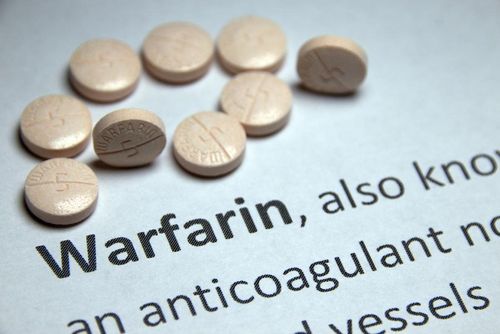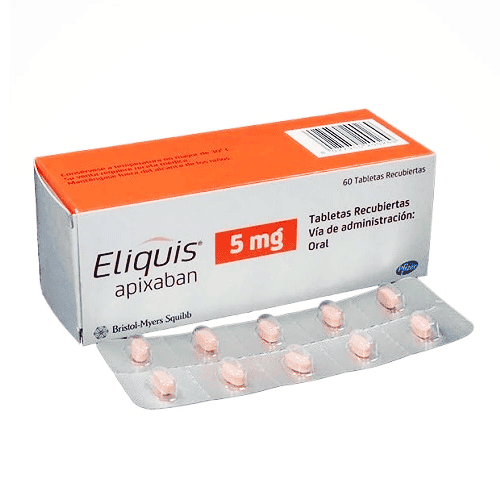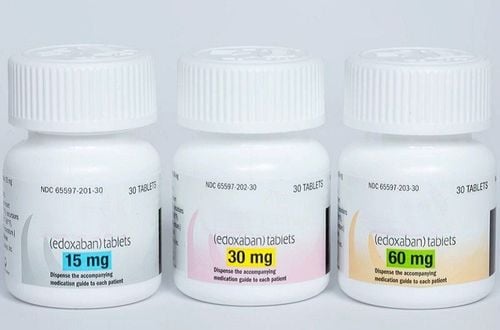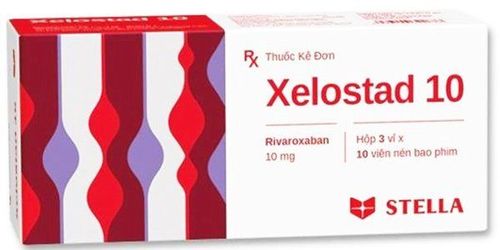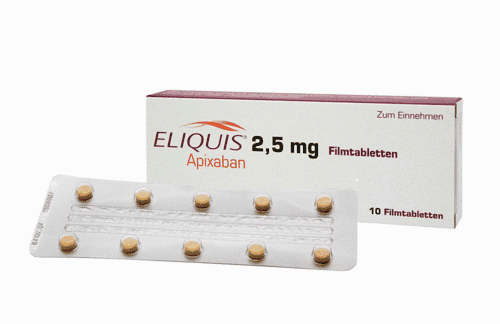This is an automatically translated article.
The main ingredient of Arixtra is Fondaparinux, a selective factor Xa inhibitor. Fondaparinux's mechanism of action is antithrombin III-mediated selective inhibition of factor Xa. Thereby disrupting blood clotting, inhibiting thrombin formation and the development of blood clots.1. What are the effects of Arixtra?
The main ingredient of Arixtra is Fondaparinux with a strength of 2.5mg. Fondaparinux is a selective inhibitor of activated factor X (Xa). The mechanism of action of fondaparinux is antithrombin III-mediated selective inhibition of factor Xa. Inhibition of factor Xa disrupts blood clotting, inhibiting thrombin formation and clot growth. Fondaparinux does not inactivate thrombin and has no effect on platelets.2. Indications of the drug Arixtra
Arixtra is indicated in the following cases:
Prevention of venous thromboembolic events (VTE) Treatment of deep vein thrombosis (DVT) Treatment of acute pulmonary embolism (PE) Treatment of angina unstable chest or non-ST-elevation myocardial infarction (UA/NSTEMI) Treatment of ST-elevation myocardial infarction (STEMI) in acute coronary syndrome (ACS) to prevent death, re-infarction development and refractory ischemia.
3. Dosage - How to use Arixtra
3.1 How to use Arixtra is administered by subcutaneous injection. Accordingly, the drug is injected under the skin by deep injection under the skin while the patient is lying down. Dosing sites should alternate between the left/right anterior abdominal wall and the left/right posterior abdominal wall.
Alternatively, the drug can be administered intravenously, but only for the first dose in patients with myocardial infarction with ST-segment elevation. When administered intravenously, should be used directly or mixed into a small bag containing 0.9% saline solution. After use, the infusion tube should be rinsed with physiological saline to ensure all medication has been administered. If the drug is to be administered via a small bag, it should be infused intravenously over 1 to 2 minutes.
3.2 Dosage Adult patients
Treatment of venous thromboembolism (VTE) and pulmonary embolism (PE):
The recommended dose is 7.5 mg (patients with body weight between 50kg and less than 100kg) ), subcutaneously once daily. For patients with body weight < 50 kg, the recommended dose is 5 mg. For patients with body weight > 100 kg, the recommended dose is 10 mg. Treatment should be continued for at least 5 days and until oral anticoagulation is fully established. Patients should be treated as soon as possible and usually within 72 hours.
Prophylaxis of deep vein thrombosis:
For orthopedic and abdominal surgery patients: The recommended dose is 2.5 mg x 1 time/day, administered subcutaneously after surgery. Note that the first dose should not be administered before 6 hours after surgery and only when the bleeding has stopped. Treatment should be continued until the risk of embolism is reduced, usually until the patient is ambulatory, at least 5 to 9 days after surgery. For medical patients at risk of thromboembolism: The recommended dose is 2.5 mg once daily, administered subcutaneously. The usual duration of treatment is 5 to 14 days. Treatment of acute myocardial infarction with ST elevation:
The recommended dose of Arixtra is 2.5 mg x 1 time / day, the first dose is intravenous, the next doses are administered subcutaneously. Treatment should be started immediately after diagnosis and continued for up to 8 days or until the patient is discharged.
Special subjects:
Elderly people: No need to adjust the dose of Arixtra. In patients 75 years of age and older, it should be used with caution because of decreased renal function. Children: Arixtra is not recommended for use in children under 17 years of age because of the lack of data on safety and efficacy. Renal impairment: Arixtra should be used with caution in patients with moderate renal impairment. The drug should not be used in patients with severe renal impairment (creatinine clearance < 30 ml/min). Hepatic impairment: No dose adjustment of Arixtra is required in patients with mild to moderate hepatic impairment. In patients with severe hepatic impairment, the drug should be used with caution.
4. Contraindications of Arixtra
Do not use Arixtra in the following cases:
Patients with known hypersensitivity to the active substance or to any of the excipients in the formulation The patient is experiencing clinically significant bleeding. Patient has acute bacterial endocarditis. Severe renal impairment with creatinine clearance < 30 ml/min.
5. Side effects of the drug Arixtra
Patients using Arixtra may experience some side effects as follows:
Frequency > 10%:
Hematology: Anemia Frequency 1 to 10%:
Cardiovascular: Hypotension Nervous system Central: Insomnia, dizziness, confusion Dermatology: Increased wound exudate, skin blistering Endocrine and metabolic: Hypokalemia Hematology: Purpura, thrombocytopenia, hematoma, hemorrhage Liver: Increased serum ALT, increased serum AST Infection: Postoperative wound infection Respiratory: Nosebleeds Frequency <1%: Anaphylaxis, anaphylaxis, angioedema, local thrombosis, elevated aPTT , epidural hematoma, injection site reaction (bleeding, skin rash, pruritus), intracranial hemorrhage, severe thrombocytopenia, spinal hematoma, haemorrhagic death
6. What is the note when using Arixtra?
Arixtra should not be administered intramuscularly. Risk of bleeding: Monitor patient closely for signs or symptoms of bleeding. Note that certain patients are at higher risk of bleeding, including: bacterial endocarditis, congenital or acquired bleeding disorders, peptic ulcer disease, uncontrolled arterial hypertension , hemorrhagic stroke, used immediately after brain surgery, patients receiving concomitant treatment with platelet inhibitors, thrombocytopenia, renal failure and patients <50 kg. Do not take with other drugs that increase the risk of bleeding unless absolutely necessary to control the patient's underlying condition. Thrombocytopenia Risk: There have been reports of thrombocytopenia similar to heparin-induced thrombocytopenia. Monitor the patient closely and discontinue therapy if the platelet count falls to <100000/mm3. Renal impairment: May increase the risk of bleeding in patients with renal or hepatic impairment. Use with caution in patients with CrCl between 30 and 50 ml/min. Monitor renal function periodically and discontinue the drug immediately if severe renal failure develops. Elderly: Use with caution in the elderly. Of note, there is an increased risk of bleeding in patients >75 years of age. Latex allergy : Because the needle guard of the pre-filled syringe contains latex, there is the potential for an allergic reaction in patients who are sensitive to latex. Pregnancy: Use of Fondaparinux should be limited during pregnancy. Should only be used when the benefits outweigh the risks. Lactation: It is not known whether Fondaparinux passes into breast milk. According to the manufacturer, the decision to continue or stop breastfeeding during treatment should be based on the risk of exposure to the infant, the benefits of breastfeeding, and the benefits of treatment to the mother.
7. Arixtra . drug interactions
Some drug interactions of Arixtra need to be considered clinically to ensure safety when using:
The risk of bleeding may be increased when Fondaparinux and drugs that increase the risk of bleeding are used concurrently. Platelet inhibitors (aspirin), NSAIDs (piroxicam) and digoxin did not affect the pharmacokinetics of Fondaparinux. At the 10 mg dose used in studies, Fondaparinux did not affect bleeding time with aspirin or piroxicam. Omega 3 can enhance the anticoagulant effect of Fondaparinux Cilostazol drug can increase the anticoagulant activity of Fondaparinux The article has provided information on the use, dosage and notes when using Arixtra drug. If the patient experiences unusual symptoms while taking the drug such as bruising, bleeding teeth, etc., they should immediately notify the doctor for timely adjustment.
Follow Vinmec International General Hospital website to get more health, nutrition and beauty information to protect the health of yourself and your loved ones in your family.
Please dial HOTLINE for more information or register for an appointment HERE. Download MyVinmec app to make appointments faster and to manage your bookings easily.




